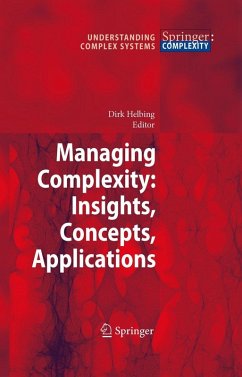
Decision Modelling and Information Systems (eBook, PDF)
The Information Value Chain
Versandkostenfrei!
Sofort per Download lieferbar
112,95 €
inkl. MwSt.
Weitere Ausgaben:

PAYBACK Punkte
56 °P sammeln!
In Decision Modelling And Information Systems: The Information Value Chain the authors explain the interrelationships between the decision support, decision modelling, and information systems.The first two parts of the book focus on the interdisciplinary decision support framework, in which mathematical programming (optimization) is taken as the inference engine. The role of business analytics and its relationship with recent developments in organisational theory, decision modelling, information systems and information technology are considered in depth. Part three of the book includes a caref...
In Decision Modelling And Information Systems: The Information Value Chain the authors explain the interrelationships between the decision support, decision modelling, and information systems.
The first two parts of the book focus on the interdisciplinary decision support framework, in which mathematical programming (optimization) is taken as the inference engine. The role of business analytics and its relationship with recent developments in organisational theory, decision modelling, information systems and information technology are considered in depth. Part three of the book includes a carefully chosen selection of invited contributions from internationally-known researchers. These contributions are thought-provoking and cover key decision modelling and information systems issues.
The final part of the book covers contemporary developments in the related area of business intelligence considered within an organizational context. The topics cover computing delivered across the web, management decision-making, and socio-economic challenges that lie ahead. It is now well accepted that globalisation and the impact of digital economy are profound; and the role of e-business and the delivery of decision models (business analytics) across the net lead to a challenging business environment. In this dynamic setting, decision support is one of the few interdisciplinary frameworks that can be rapidly adopted and deployed to so that businesses can survive and prosper by meeting these new challenges.
The first two parts of the book focus on the interdisciplinary decision support framework, in which mathematical programming (optimization) is taken as the inference engine. The role of business analytics and its relationship with recent developments in organisational theory, decision modelling, information systems and information technology are considered in depth. Part three of the book includes a carefully chosen selection of invited contributions from internationally-known researchers. These contributions are thought-provoking and cover key decision modelling and information systems issues.
The final part of the book covers contemporary developments in the related area of business intelligence considered within an organizational context. The topics cover computing delivered across the web, management decision-making, and socio-economic challenges that lie ahead. It is now well accepted that globalisation and the impact of digital economy are profound; and the role of e-business and the delivery of decision models (business analytics) across the net lead to a challenging business environment. In this dynamic setting, decision support is one of the few interdisciplinary frameworks that can be rapidly adopted and deployed to so that businesses can survive and prosper by meeting these new challenges.
Dieser Download kann aus rechtlichen Gründen nur mit Rechnungsadresse in A, B, BG, CY, CZ, D, DK, EW, E, FIN, F, GR, HR, H, IRL, I, LT, L, LR, M, NL, PL, P, R, S, SLO, SK ausgeliefert werden.












